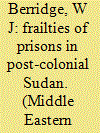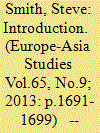| Srl | Item |
| 1 |
ID:
146786


|
|
|
|
|
| Summary/Abstract |
This article examines the slow eclipse of the rehabilitative ideal within the Sudanese prison system in the period from independence in 1956 till the removal of the third parliamentary regime in 1989. It contends that Jacfar Numayri's ‘Islamization’ of the criminal and penal system in 1983, which has been interpreted by some as an act of religious revival aiming to replace a series of externally imposed and European laws, cannot be understood purely in cultural terms. It will demonstrate that the Sudanese prison professionals of the post-colonial era pursued rehabilitative ideals with greater enthusiasm than their colonial predecessors. However, they were hampered by the limited resources offered to them by a government that became increasingly less interested in infrastructural social control and more concerned with exercising direct physical violence against both political and non-political transgessors of the state's law.
|
|
|
|
|
|
|
|
|
|
|
|
|
|
|
|
| 2 |
ID:
124300


|
|
|
|
|
| Publication |
2013.
|
| Summary/Abstract |
The essays in this collection focus in different ways on the ambiguities and paradoxes of 'villains' and 'victims' in late-Imperial Russia and the early Soviet Union. They derive from a conference on 'Villains and Victims: Justice, Violence and Retribution in Late-Imperial and Early Soviet Russia', which was organised by Sarah Badcock and took place at the University of Nottingham on 6-7 April 2010. The title of the conference had a certain alliterative charm, which is compounded by the fact that most of the essays in this collection also concern violence: violence being the terrain on which villains and victims tended to meet.
|
|
|
|
|
|
|
|
|
|
|
|
|
|
|
|
| 3 |
ID:
077066


|
|
|
|
|
| Publication |
2007.
|
| Summary/Abstract |
There is a substantial moralistic streak in U.S. elite attitudes about war against states perceived as evil. Among opinion leaders, death penalty supporters were substantially more likely than opponents to support the 1991 Gulf War, condone the Iraqi death toll, and favor escalating the war to topple Saddam Hussein. These relationships persist after controlling for ideology, nationalism, and instrumental beliefs about force and thus probably result from individual differences in retributiveness and humanitarianism, moral values known to underlie death penalty attitudes. Foreign policy expertise moderated this effect only on the regime change issue, and then only moderately, suggesting that "moral punitiveness" might also influence the thinking of decision makers. President George H. W. Bush evidently felt real moral outrage during the crisis about Iraq's aggression, but he refrained from escalating the war to punish Saddam more severely for it.
|
|
|
|
|
|
|
|
|
|
|
|
|
|
|
|